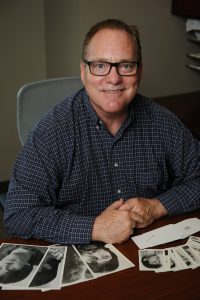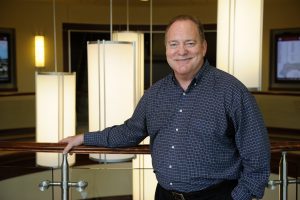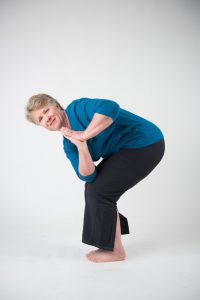
Dr. Graham McDougall is no stranger to the effects of memory loss on the elderly. As a teenager, he watched his maternal grandmother develop severe memory loss that worsened over a two-year period.
“As a family, we all felt helpless,” recalls The University of Alabama nursing professor. “Then my grandfather died, and she was left without a caregiver. We moved my grandmother into our home, and, after a few months of her odd behaviors, such as staying up all night and not eating properly, we were stressed and exhausted from the demands of providing care. My mom made the decision to move her into a nursing home.”
This experience was a key factor in McDougall’s decision to learn more and specialize in the care of older adults as he furthered his education. He has focused more than 25 years of research on adults at-risk for memory loss.
“Cognitive aging is a universal phenomenon in that no one is exempt from its effects,” he says. “And it is irreversible in that its effects may sometimes be slowed through intervention, but they cannot be reversed.”
While past research had provided key answers to what successful aging might look like, McDougall says a “comprehensive and holistic model” had not been developed to help older adults “improve, maintain or prevent decline in the everyday memory.”
“As our knowledge has increased, we’ve come to understand the importance of adaptation and emotional well-being in successful aging, and that, for most older people, subjective quality of life is strongly tied with traits such as resilience, optimism and mental and emotional status,” he says.
With this in mind, McDougall began, in 1994, developing the Cognitive-Behavioral Model of Everyday Memory. His research is based on psychologist and mentor Albert Bandura’s theory of self-efficacy, which basically states that self-efficacy is “about a person’s beliefs regarding their ability to succeed, and these beliefs are determinants of how they think, behave and feel.”
OPTIMISM HELPS
“The argument for using self-efficacy theory for memory improvement is that older adults lack a sense of mastery for memory abilities, either because they have observed changes in their own memory or because a commonly held conception of ‘aging’ says that memory declines are inevitable,” McDougall says. “Older people who believe declines in memory are inevitable may not have the motivation to put forth the effort that younger adults do to remember, and consequently, they then remember less, experience reduced feelings of self-efficacy and so on.”
The Cognitive-Behavioral Model of Everyday Memory, which used stress inoculation, health promotion, memory self-efficacy and memory strategy training, was a model for what McDougall deemed his “major accomplishment” – the development of Senior WISE, or Wisdom is Simply Exploration. This training intervention has been copyrighted and trademarked with the U.S. Patent Office.

Using data from a series of nine cognitive aging intervention studies, McDougall developed this new efficacy-based memory training intervention that uses health promotion interventions and classroom instruction to help improve and maintain memory.
The first group of studies, between 1996-1998, developed and refined the intervention. Four groups of older adults from various settings, including assisted living, a nursing home retirement community and a Hispanic senior center, were included at the intervention sites. The model and intervention were refined with 187 older adults.
McDougall’s first Senior WISE project tested in a large randomized clinical trial began in 2001 with a five-year, $2.4 million study funded by the National Institutes of Health. It looked at whether memory training could improve older adults’ daily functions.
Memory training was tested against health training as the comparison treatment. This first study had 265 participants (65 years and older) from Caucasian, Hispanic and African-American populations, which, McDougall says, made it the first memory intervention study in the country that included a tri-ethnic sample.
“It’s obvious that as older people show increases in memory loss, serious problems with instrumental activities of daily living begin to emerge,” he says. “Senior WISE hypothesized that important daily instrumental tasks, such as remembering to correctly take medications, could be enhanced through memory training interventions.”
It was already understood that older adults can improve their memory, but no one knew if a memory training program could actually help improve those daily living activities. With the Senior WISE study, McDougall not only wanted to improve memory performance and reduce anxiety, he wanted to see improvement in the things that the participants do every day – making phone calls, taking medications, paying bills.
A RESEARCH ADVENTURE
The Senior WISE intervention techniques focused on four key areas: stress inoculation, confidence building, health promotion and strategy training. The exercises used required participants to learn new information and refine skills they already knew, so it was more “fun and games.”

Comfort level among the group was also a key factor. As participants watched their friends also experience memory weaknesses, a bond was formed. Relaxation techniques and deep-breathing helped reduce the anxiety they felt during stressful situations, like memory lapses, which helped improve confidence in their abilities.
“Over the past 25 years, the research has been an adventure working with the hundreds of older adults who have participated in my studies,” McDougall says. “I am always amazed at the curiosity and responses that these individuals manifest when they grow from learning new information.

“Many older adults do not change their negative beliefs about memory and aging. Even though many of these beliefs are based on negative stereotypes and have been disproven, many individuals are unable to become more confident in their memory skill and are functioning below their capacity.”
A more recent addition to the memory training intervention integrated Yoga training into Senior WISE sessions. With an average age of 83, participants attending an average of eight sessions increased their memory performance from “Poor” to “Normal.”
More than 1,000 older adults have since participated in some form of health promotion interventions through Senior WISE, but McDougall is not finished. He launched Senior WISE at Capstone Village, UA’s retirement community, last summer.
His newest research interest involves Chemo Brain, a “real phenomenon experienced by women who were treated with chemotherapy.”
About 30 percent of breast cancer survivors experience long-term cognitive deficits six months after completing chemotherapy, he says. While the average age of a breast cancer survivor is approximately 61, this cognitive problem is particularly disturbing to younger cancer survivors who are continuing to maintain their careers.
“While the majority of cancer survivors are grateful to be alive after being diagnosed with breast cancer, the doctors and nurses do not know how to treat this cognitive system,” McDougall says. “Many providers continue to tell the women they are experiencing anxiety or fatigue.”
He is pursuing funding to further his research into Chemo Brain. Once in place, McDougall will launch into another area of memory loss, expanding the world’s knowledge while also enriching people’s lives.
Dr. McDougall is the Martha Lucinda Luker Saxon Endowed Chair in Rural Health at UA’s Capstone College of Nursing.
